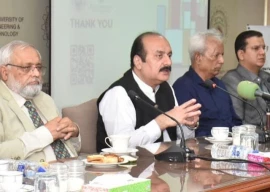
Having served as the UNFPA representative in Pakistan for nearly a year, I would like to share a few observations regarding the journey of population management in the country. Obviously, Pakistan does not have a success story to tell. On the contrary, it is lagging all its counterpart countries even though its family planning programme is among the oldest. Key performance indicators such as population growth, maternal mortality rate, child mortality, prevalence of modern contraceptives, maternal health, nutrition and women’s human capital and economic participation show poor performance in Pakistan.
Pakistan has all the ingredients for success, but the recipe does not exist. The nation has a wealth of expertise and insights on how to run the family planning and population agenda. Throughout numerous conversations and interactions, I have noted that many Pakistani experts and practitioners within the realms of government, academia and civil society deserve international recognition for their innovative and out-of-the-box contributions. Notably, several individuals from Pakistan have significantly influenced the global development agenda, particularly in areas such as sexual and reproductive health. Dr Nafis Sadik, the former executive director of UNFPA, was one such pride of Pakistan who shaped the global discourse on population and women’s empowerment. Looking at the brilliance of these experts, the question arises: why didn’t Pakistan’s population agenda progress well? What was lacking?
The bitter reality is that the management of the population agenda in Pakistan is characterised by poor institutional governance, lack of sustained political commitment and very weak community coordination and mobilisation. It is therefore very difficult to show accumulated success and sustainable progress. Governments’ genuine efforts measured by plans, funding and interventions are not validated by the statistics of the latest population census and other health indicators. When knowledge on the gaps, challenges and potential scenarios is almost known, then where is the problem? One may ask.
My observation speaks to the short-term day-by-day crisis management mindset around public interventions that further pushes the already marginalised population agenda away from the centre of government priorities. The tendency of politicians to adopt interventions in the comfort zone of all stakeholders has weakened the possibility of introducing genuine surgical solutions, arising courageous champions; and taking the right steps even if not popular. The population agenda, in fact, was left to the government to work with other government entities that managed the process well but without introducing critical solutions based on the whole-of-community efforts and contributions. Therefore, we see that Pakistan took the path of managing the problems and challenges but did not take the advisable trajectory of introducing long-term solutions which required politicians to work outside their comfort zone.
Another observation is related to the distraction in the management of the population agenda at the government level with under-utilised technical and financial assistance from the international community including UNFPA, USAID and other donors and International Financial Institutions (IFIs). Projects are implemented in isolation and not in coherence with the national agenda. Efforts are sometimes duplicated or managed through a project-focused ad-hoc structures which may not directly contribute to the long-term vision of population management. As a result, the desired outcomes in terms of population stabilisation and improved reproductive health have been difficult to achieve.
Limited mobilisation of national efforts to partner with all sectors and groups in shouldering the burden of population growth and contributing to solutions is my fourth observation. It should be noted that the private sector is mainly absent; it is surprising that in a market of over 240 million people, the private sector could not find a breakthrough to manufacture full spectrum of contraceptives that Pakistan needs. It is also a fact that after more than 70 years of the family planning programme in Pakistan, many religious and tribal leaders are yet to be sensitised on the importance of the issue for the well-being of present and future generations. Unfortunately, the momentum of the community mobilisation has not been very promising either.
Hence, a genuine shift is imperative at this critical juncture when Pakistan has become fifth most populous country in the world. Immediate steps for this shift include moving away from ad-hoc implementation of family planning initiatives, introducing genuine institutional reforms, mobilising communities and the private sector, and ensuring that family planning is on the top priorities of political leadership especially the chief ministers. Population growth could hinder all the efforts to get Pakistan out of the current economic crisis now and in the future if Pakistan fails to calibrate population growth and resources. Governments cannot impose solutions that are not based on human rights because such solutions are counter-productive and cause long-term distortions.
The interim caretaking government has a golden opportunity to put forward a sound foundation of a reasonable fit-to-purpose family planning programme, to reposition population management as a top priority and to make all the “unpopular” decisions to move the portfolio in the right direction. This would be the best service provided for the future of the nation and to pave the road for genuine legacy to be handed over to the government after the elections.
Published in The Express Tribune, September 9th, 2023.
Like Opinion & Editorial on Facebook, follow @ETOpEd on Twitter to receive all updates on all our daily pieces.











-(1)1717678110-0/Kendrick-(1)-(1)1717678110-0-270x192.webp)



COMMENTS
Comments are moderated and generally will be posted if they are on-topic and not abusive.
For more information, please see our Comments FAQ